Related Research Articles

Julia Agrippina, also referred to as Agrippina the Younger, was Roman empress from AD 49 to 54, the fourth wife and niece of emperor Claudius, and the mother of Nero.
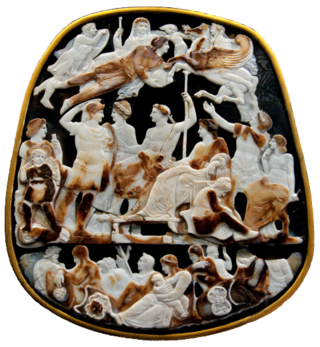
The Julio-Claudian dynasty comprised the first five Roman emperors: Augustus, Tiberius, Caligula, Claudius, and Nero.
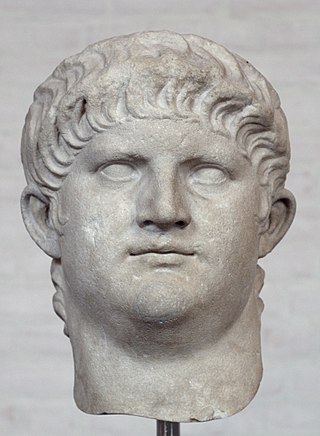
Nero Claudius Caesar Augustus Germanicus was a Roman emperor and the final emperor of the Julio-Claudian dynasty, reigning from AD 54 until his death in AD 68.

Around the start of the Common Era, the family trees of the gens Julia and the gens Claudia became intertwined into the Julio-Claudian family tree as a result of marriages and adoptions.

Gaius Suetonius Tranquillus, commonly referred to as Suetonius, was a Roman historian who wrote during the early Imperial era of the Roman Empire. His most important surviving work is a set of biographies of 12 successive Roman rulers from Julius Caesar to Domitian, properly titled De vita Caesarum. Other works by Suetonius concerned the daily life of Rome, politics, oratory, and the lives of famous writers, including poets, historians, and grammarians. A few of these books have partially survived, but many have been lost.

Marcus Annaeus Lucanus, better known in English as Lucan, was a Roman poet, born in Corduba, Hispania Baetica. He is regarded as one of the outstanding figures of the Imperial Latin period, known in particular for his epic Pharsalia. His youth and speed of composition set him apart from other poets.

Titus Caesar Vespasianus was Roman emperor from 79 to 81. A member of the Flavian dynasty, Titus succeeded his father Vespasian upon his death, becoming the first Roman emperor to succeed his biological father.
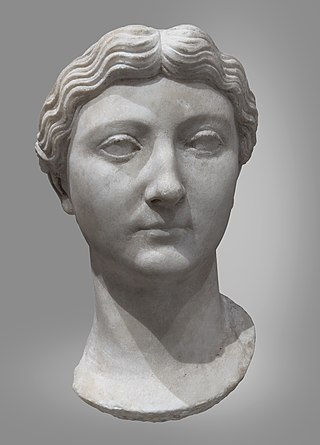
Livia Drusilla was Roman empress from 27 BC to AD 14 as the wife of emperor Augustus. She was known as Julia Augusta after her formal adoption into the Julian family in AD 14.
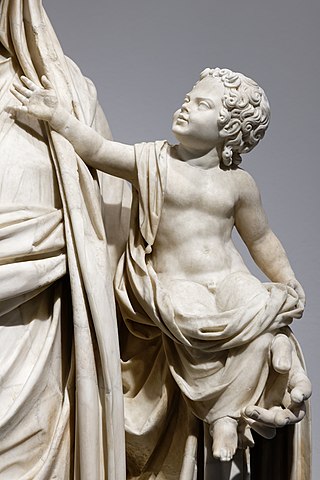
Tiberius Claudius Caesar Britannicus, usually called Britannicus, was the son of Roman Emperor Claudius and his third wife, Valeria Messalina. For a time, he was considered his father's heir, but that changed after his mother's downfall in 48, when it was revealed she had engaged in a bigamous marriage without Claudius' knowledge. The next year, his father married Agrippina the Younger, Claudius' fourth and final marriage. Their marriage was followed by the adoption of Agrippina's son, Lucius Domitius, whose name became Nero as a result. His stepbrother would later be married to Britannicus' sister Octavia and soon eclipsed him as Claudius' heir. After his father's death in October 54, Nero became emperor. The sudden death of Britannicus shortly before his fourteenth birthday is reported by all extant sources as being the result of poisoning on Nero's orders; as Claudius' biological son, he represented a threat to Nero's claim to the throne.

Gaius Caesar was a grandson and heir to the throne of Roman emperor Augustus, alongside his younger brother Lucius Caesar. Although he was born to Marcus Vipsanius Agrippa and Julia, Augustus' only daughter, Gaius and Lucius were raised by their grandfather as his adopted sons and joint-heirs. He experienced an accelerated political career befitting a member of the Julio-Claudian dynasty, with the Roman Senate allowing him to advance his career without first holding a quaestorship or praetorship, offices that ordinary senators were required to hold as part of the cursus honorum.

Poppaea Sabina, also known as Ollia, was a Roman empress as the second wife of the emperor Nero. She had also been wife to the future emperor Otho. The historians of antiquity describe her as a beautiful woman who used intrigues to become empress.
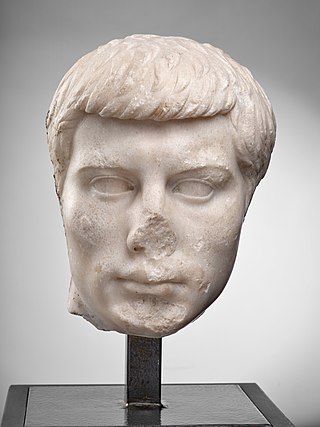
Tiberius Julius Caesar Nero, known as Tiberius Gemellus, was the son of Drusus and Livilla, the grandson of the Emperor Tiberius, and the cousin of the Emperor Caligula. Gemellus is a nickname meaning "the twin". His twin brother, Germanicus Gemellus, died as a young child in AD 23. His father and older cousins died, and are suspected by contemporary sources as having been systematically eliminated by the powerful praetorian prefect Sejanus. Their removal allowed Gemellus and Caligula to be named joint-heirs by Tiberius in 35, a decision that ultimately resulted in Caligula assuming power and having Gemellus killed in late 37 or early 38.
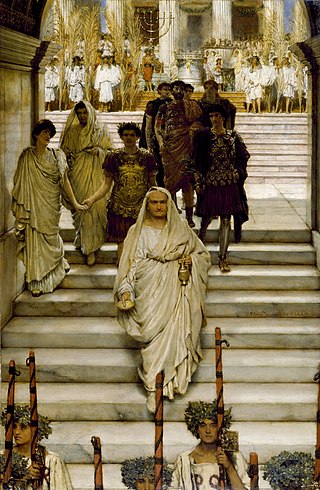
The Flavian dynasty, lasting from AD 69 to 96, was the second dynastic line of emperors to rule the Roman Empire following the Julio-Claudians, encompassing the reigns of Vespasian and his two sons, Titus and Domitian. The Flavians rose to power during the civil war of AD 69, known as the Year of the Four Emperors; after Galba and Otho died in quick succession, Vitellius became emperor in mid 69. His claim to the throne was quickly challenged by legions stationed in the eastern provinces, who declared their commander Vespasian emperor in his place. The Second Battle of Bedriacum tilted the balance decisively in favor of the Flavian forces, who entered Rome on 20 December, and the following day, the Roman Senate officially declared Vespasian emperor, thus commencing the Flavian dynasty. Although the dynasty proved to be short-lived, several significant historic, economic and military events took place during their reign.

Drusus Julius Caesar, also called Drusus the Younger, was the son of Emperor Tiberius, and heir to the Roman Empire following the death of his adoptive brother Germanicus in AD 19.

Drusus Caesar was the adopted grandson and heir of the Roman emperor Tiberius, alongside his brother Nero. Born into the prominent Julio-Claudian dynasty, Drusus was the son of Tiberius' general and heir, Germanicus. After the deaths of his father and of Tiberius' son, Drusus the Younger, Drusus and his brother Nero Caesar were adopted together by Tiberius in September AD 23. As a result of being heirs of the emperor, he and his brother enjoyed accelerated political careers.

Nero Julius Caesar was the adopted grandson and heir of the Roman emperor Tiberius, alongside his brother Drusus. Born into the prominent Julio-Claudian dynasty, Nero was the son of Tiberius' general and heir, Germanicus. After the deaths of his father and of Tiberius' son, Drusus the Younger, Nero and his brother Drusus were adopted together by Tiberius in September AD 23. As a result of being heirs of the emperor, he and his brother enjoyed accelerated political careers.

De vita Caesarum, commonly known as The Twelve Caesars, is a set of twelve biographies of Julius Caesar and the first 11 emperors of the Roman Empire written by Gaius Suetonius Tranquillus. The subjects consist of: Julius Caesar, Augustus, Tiberius, Caligula, Claudius, Nero, Galba, Otho, Vitellius, Vespasian, Titus, Domitian.
A.D. (1985) is an American/Italian miniseries in six parts that adapts the narrative in the Acts of the Apostles. Considered as the third and final installment in a TV miniseries trilogy that began with Moses the Lawgiver (1974) and Franco Zeffirelli's Jesus of Nazareth (1977), it was adapted from Anthony Burgess's 1985 novel The Kingdom of the Wicked, which was itself a sequel to Burgess's book Man of Nazareth, on which was based Zeffirelli's movie. The title is the abbreviation for Anno Domini, as the events occur in the first years of the Christian Era.
Marcus Cluvius Rufus was a Roman consul, senator, governor, and historian who was mentioned on several occasions by Tacitus, Suetonius, Cassius Dio, Josephus and Plutarch.
In classical antiquity, the Juvenalia, or Ludi Juvenales, were scenic games instituted by Nero in 59 AD, at the age of 21, in commemoration of his shaving his beard for the first time, thus indicating that he had passed from youth into manhood. These games were not celebrated in the circus, but in a private theatre erected in a pleasure-ground (nemus), and consisted of every kind of theatrical performance, Greek and Roman plays, mimetic pieces, and the like.
References
- Suetonius, The Lives of Twelve Caesars, Life of Nero 12
- Tacitus, "Life of Lucanus", The Lives of the Poets
- Annals XIV.20 and XVI.2, and Cassius Dio, Roman History LXI.21.